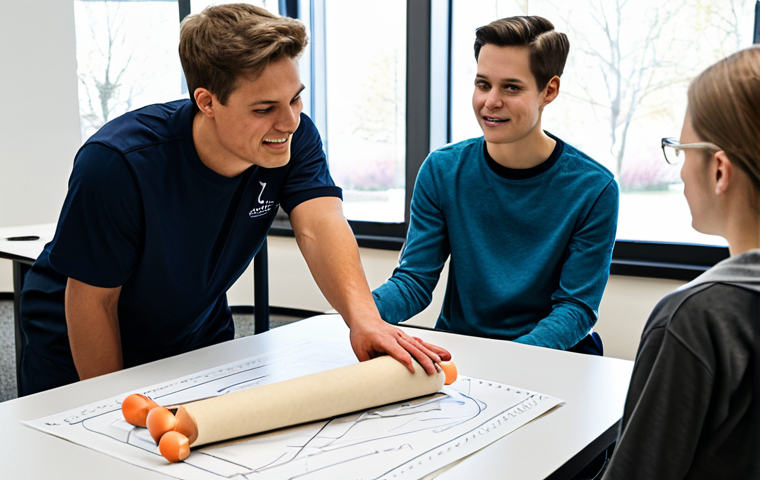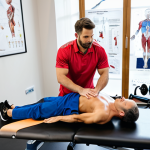Alright, let’s dive into the world of academic success for aspiring sports rehabilitation professionals! As someone who’s navigated the demanding terrain of athletic training and rehab studies, I can tell you firsthand that juggling intense coursework, clinical hours, and, you know, a *life* can feel like an Olympic sport in itself.
The pressure to maintain a high GPA while simultaneously absorbing all that practical knowledge? It’s real. But here’s the thing: it’s absolutely achievable with the right strategies.
Having solid grades opens doors to amazing opportunities, like prestigious internships and specialized certifications that really set you apart. Trust me, I’ve seen it.
We’ll break down some actionable tips and insights I’ve picked up along the way that’ll help you ace those exams and stay on top of your academic game without burning out.
So, let’s get ready to ace your academics – let’s clearly explore it in the article below!
Alright, buckle up, future sports rehab stars!
Mastering Time Management: Your Secret Academic Weapon

Time, the ultimate precious commodity! Especially when you’re juggling lectures, practical placements, gym sessions (for *yourself*, naturally), and trying to have some semblance of a social life.
The key? Ruthless prioritization and efficient scheduling. Let’s break it down:
1. The Eisenhower Matrix Method: Urgent vs. Important
Okay, so you’ve probably heard of this before, but seriously, put it into practice. Divide your tasks into four quadrants: Urgent/Important, Not Urgent/Important, Urgent/Not Important, and Not Urgent/Not Important.
Focus on the Important stuff first – studying, assignment prep, sleep. Delegate or ditch the rest. I used to get bogged down in answering every email immediately, but guess what?
Most could wait!
2. Batch Similar Tasks: Boost Your Focus
Multitasking is a myth, people! Our brains aren’t wired to do it effectively. Instead, group similar tasks together.
For example, dedicate a block of time solely for reading journal articles, then another block just for writing. This way, you get into a flow state and avoid the mental whiplash of constantly switching gears.
Personally, I would block out entire afternoons dedicated solely to studying specific muscles or injury types – immersing myself completely.
3. Embrace the Power of ‘No’ (and Learn to Say It Politely)
This one’s HUGE! Friends want you to join their impromptu movie night? Gotta decline if you have a massive anatomy exam looming.
Volunteer opportunities sound amazing? Maybe next semester when your schedule is less insane. It’s okay to say no!
Your academics are your priority right now. Suggest alternatives – “I’m swamped this week, but let’s grab coffee next Tuesday!” It’s about setting boundaries and protecting your time.
Leveraging Your Learning Style: Smart, Not Just Hard
We all learn differently. Some of us are visual learners, others are auditory, and some are kinesthetic. Figuring out *your* preferred learning style can seriously level up your study game.
1. Identifying Your Learning Style: The Quiz is Just the Start
There are tons of online quizzes that claim to pinpoint your learning style. Take them! They’re a fun starting point.
But don’t stop there. Experiment with different study methods to see what *actually* works for you. I thought I was a visual learner until I started recording my notes and listening to them while I worked out.
Turns out, auditory learning was my jam!
2. Tailoring Your Study Methods: Making it Stick
Once you know your learning style, customize your approach. Visual learners, use diagrams, mind maps, and color-coded notes. Auditory learners, record lectures, participate in study groups, and teach concepts to others.
Kinesthetic learners, get hands-on with models, practice techniques, and take frequent breaks to move around. For example, When I was studying knee biomechanics, I built a makeshift knee joint out of cardboard and rubber bands to physically understand the movement.
Sounds ridiculous, but it worked!
3. Combine Multiple Styles: The Ultimate Learning Power-Up
Don’t limit yourself to just one style. Mix and match! Create visual flashcards with auditory cues (say the answer aloud as you write it).
Build a model and explain the concepts to a study buddy (kinesthetic + auditory). The more senses you engage, the better you’ll retain the information.
Active Recall and Spaced Repetition: Ditch the Cramming!
Cramming might get you through the short term, but it’s a terrible strategy for long-term retention. Active recall and spaced repetition are your allies in the fight against forgetting.
1. Active Recall: Testing Yourself Without Mercy
Instead of passively rereading your notes, actively try to recall the information from memory. Use flashcards, practice questions, or simply quiz yourself aloud.
The struggle to retrieve the information strengthens the neural pathways in your brain, making it easier to remember later. I used to write out practice exam questions and then try to answer them from memory, without looking at my notes.
It was brutal at first, but it really highlighted the areas where I needed to focus.
2. Spaced Repetition: Reviewing at Optimal Intervals
Don’t just review everything all at once. Space out your review sessions over time. The Ebbinghaus forgetting curve shows that we forget information rapidly at first, then the rate of forgetting slows down.
Reviewing the material just before you’re about to forget it strengthens your memory and extends the time before you need to review it again. There are apps like Anki that use spaced repetition algorithms to schedule your reviews automatically.
Game-changer!
3. The Feynman Technique: Understanding, Not Just Memorizing
This is my personal favorite. Take a concept you’re struggling with and try to explain it to someone else in simple, everyday language. If you can’t explain it clearly, you don’t truly understand it.
Go back to your notes and keep simplifying until you can. I used to practice explaining complex concepts to my non-sports rehab friends. If they understood, I knew I was on the right track!
The Power of Study Groups: Collaboration, Not Just Chatting
Study groups can be incredibly valuable, but only if you use them effectively. It’s not just about socializing; it’s about leveraging the collective knowledge of your peers.
1. Finding the Right Group: Compatibility is Key
Choose your study buddies wisely. Look for people who are motivated, engaged, and have different strengths and weaknesses than you. A diverse group can bring different perspectives and fill in knowledge gaps.
And be sure to set ground rules upfront – stay focused, come prepared, and respect each other’s time.
2. Dividing and Conquering: Assigning Roles and Responsibilities
Don’t just sit around passively. Assign roles and responsibilities. One person can be the note-taker, another can be the question-master, and another can be the devil’s advocate.
This ensures that everyone is actively participating and contributing.
3. Teaching is Learning: Explaining Concepts to Each Other
The best way to solidify your understanding of a concept is to teach it to someone else. Take turns explaining different topics to the group. Answering questions and clarifying doubts will reinforce your own knowledge and identify areas where you still need to improve.
Prioritizing Your Well-being: Sleep, Nutrition, and Stress Management

You can’t pour from an empty cup. Your physical and mental well-being are essential for academic success.
1. Sleep Hygiene: The Unsung Hero of Academic Performance
Aim for 7-8 hours of quality sleep per night. Establish a regular sleep schedule, create a relaxing bedtime routine, and avoid screens before bed. Sleep deprivation can impair your cognitive function, making it harder to focus, learn, and remember information.
2. Fueling Your Brain: Nutrition for Optimal Performance
Eat a balanced diet rich in fruits, vegetables, whole grains, and lean protein. Avoid processed foods, sugary drinks, and excessive caffeine. Your brain needs nutrients to function properly.
Staying hydrated is also crucial. I always kept healthy snacks on hand – nuts, fruits, yogurt – to avoid reaching for junk food when I was stressed or tired.
3. Stress Management Techniques: Finding What Works for You
Find healthy ways to manage stress. Exercise, meditation, yoga, spending time in nature, listening to music, or pursuing a hobby can all help. Don’t be afraid to seek help from a counselor or therapist if you’re struggling to cope.
Here’s a breakdown of how to balance your academic life:
| Area | Importance | Tips |
|---|---|---|
| Academics | High | Prioritize tasks, use active recall, form study groups |
| Sleep | High | Maintain a regular sleep schedule, create a relaxing bedtime routine |
| Nutrition | High | Eat a balanced diet, stay hydrated, avoid processed foods |
| Stress Management | High | Exercise, meditate, spend time in nature, seek professional help if needed |
| Social Life | Medium | Schedule time for socializing, but don’t let it interfere with your priorities |
| Hobbies | Medium | Pursue activities you enjoy to relax and recharge |
Seeking Help When Needed: It’s a Sign of Strength, Not Weakness
Don’t be afraid to ask for help when you’re struggling. Your professors, TAs, and classmates are all valuable resources.
1. Attending Office Hours: Maximizing Your Face Time
Take advantage of your professors’ office hours. Prepare specific questions in advance and be respectful of their time. Office hours are a great opportunity to clarify concepts you’re struggling with and get personalized feedback.
2. Utilizing Tutoring Services: Getting Personalized Support
Many universities offer free tutoring services. Take advantage of them! Tutors can provide personalized support and help you develop effective study strategies.
3. Connecting with Your Peers: Building a Support Network
Don’t underestimate the power of your peers. Connect with classmates who are doing well and ask for their advice. Share notes, study together, and support each other.
Embracing Failure as a Learning Opportunity: It’s Part of the Process
Everyone fails at some point. The key is to learn from your mistakes and keep moving forward.
1. Analyzing Your Mistakes: Identifying Areas for Improvement
Don’t just brush off your failures. Take the time to analyze what went wrong. Identify the specific areas where you struggled and develop a plan to improve.
2. Seeking Feedback: Getting External Perspectives
Ask your professors, TAs, or classmates for feedback on your work. They can provide valuable insights and help you identify blind spots.
3. Reframing Your Mindset: Viewing Failure as a Stepping Stone
Don’t let failure discourage you. View it as an opportunity to learn and grow. Embrace a growth mindset and believe that your abilities can be developed through hard work and dedication.
Remember, acing your academics in sports rehabilitation is a marathon, not a sprint. It requires dedication, hard work, and a willingness to adapt and learn.
But with the right strategies and a positive mindset, you can achieve your goals and set yourself up for a successful career. Now go crush those exams!
Wrapping It Up
So, there you have it – your survival kit for conquering sports rehab school. Remember, it’s not about being perfect; it’s about being persistent. Embrace the grind, learn from your stumbles, and celebrate your victories, no matter how small. You’ve got this!
Handy Hacks You’ll Thank Me For Later
1. Find a mentor! Seriously, reach out to a seasoned sports physio in your area and pick their brain. Nothing beats real-world advice from someone who’s been in the trenches.
2. Invest in a good standing desk converter. Your back will thank you after those long study sessions. Trust me on this one!
3. Befriend the university librarian. They’re goldmines of information and can help you navigate databases and find obscure research papers you never knew existed.
4. Get yourself a decent coffee maker (or know where the best local cafe is). Caffeine is your friend… in moderation, of course!
5. Join a relevant professional organization like the American Physical Therapy Association (APTA). Networking opportunities and access to resources are invaluable.
Key Takeaways
Time management isn’t just about scheduling; it’s about prioritizing and protecting your time. Understanding your learning style will help you study smarter, not harder. Active recall and spaced repetition are key to long-term retention. Collaborate with your peers in study groups, and don’t forget to prioritize your well-being. And most importantly, embrace failure as a learning opportunity.
Frequently Asked Questions (FAQ) 📖
Q: How do I balance the intense workload of sports rehabilitation studies with maintaining a healthy personal life?
A: Ah, the age-old struggle! Speaking from experience, effective time management is your best friend. Seriously.
Start by creating a detailed weekly schedule that allocates specific blocks for studying, clinical hours, exercise, and, crucially, downtime. Treat your study time like appointments you can’t miss.
Batch similar tasks together to minimize context switching – for example, dedicate one afternoon to reviewing anatomy notes and another to working on a research paper.
Don’t be afraid to say “no” to commitments that drain your time or energy. And most importantly, schedule in guilt-free fun! Whether it’s catching a movie, grabbing coffee with friends, or just chilling with a good book, make sure you carve out time to recharge.
Trust me, a burned-out brain is a useless brain. Prioritize self-care – sleep, nutritious food, and regular exercise – because you can’t pour from an empty cup.
I once tried to power through a semester on caffeine and sheer willpower – let’s just say the results weren’t pretty.
Q: What’s the best way to approach studying for complex subjects like biomechanics or exercise physiology?
A: Okay, those subjects can feel like trying to decipher ancient hieroglyphics sometimes, right? My go-to strategy is to break down complex concepts into smaller, more manageable chunks.
Don’t try to cram everything at once. Focus on understanding the foundational principles first. For example, in biomechanics, make sure you thoroughly grasp the laws of motion before tackling more advanced topics like joint kinetics.
Use visual aids like diagrams, flowcharts, and even YouTube videos to help you visualize the concepts. Practice applying the knowledge by solving real-world problems or analyzing case studies.
I found it incredibly helpful to form a study group where we could explain concepts to each other – teaching someone else is a great way to solidify your own understanding.
And don’t be afraid to ask for help! Your professors and teaching assistants are there to support you. I remember struggling with a particularly tricky concept in exercise physiology, and after a quick chat with my professor during office hours, everything suddenly clicked.
Q: How important are internships and practical experience for excelling in sports rehabilitation studies, and how can I make the most of them?
A: Internships and practical experience are absolutely crucial. They’re where you truly bridge the gap between theory and practice. Look at it this way: you can memorize all the muscles in the human body, but it’s a completely different ballgame to palpate those muscles on a real athlete and assess their function.
Seek out internships that offer a variety of experiences – working with different patient populations, learning various rehabilitation techniques, and collaborating with other healthcare professionals.
During your internships, be proactive, ask questions, and don’t be afraid to get your hands dirty. Volunteer for extra tasks, take initiative to learn new skills, and actively seek feedback from your supervisors.
Treat every internship as a learning opportunity. Build relationships with your supervisors and colleagues – networking is key in this field. And don’t just focus on technical skills.
Pay attention to the soft skills like communication, empathy, and professionalism. I remember one internship where I learned just as much from observing how my supervisor interacted with patients as I did from the specific treatment protocols.
That’s where you really become a well-rounded practitioner.
📚 References
Wikipedia Encyclopedia
구글 검색 결과
구글 검색 결과
구글 검색 결과
구글 검색 결과
구글 검색 결과






